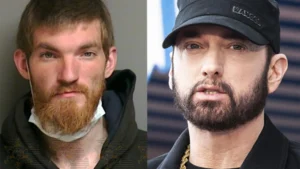Eminem’s Relentless Stalker Faces Justice Again. Matthew David Hughes, returned to court this week. He stood trial for a second home invasion last August. Hughes, 32, entered the rapper’s Detroit-area property before dawn. Security guards spotted him at 7 a.m. He fled on a stolen bike. Eminem’s team tracked him down days later at a local Walmart. They arrested Hughes, who had been living homeless in nearby woods. Prosecutors charged him with first-degree home invasion and aggravated stalking. The trial began on May 6 and ended the next day. Eminem himself took the stand. So did the rapper’s security chief. After 90 minutes of deliberation, the jury found Hughes guilty. Judge McCarthy will sentence him on June 17.
Eminem’s Relentless Stalker Faces Justice Again
Prosecutor Seven Fox painted a stark picture of fear. “Marshall Mathers has taken extraordinary steps to protect himself and his family,” she told the jury. Eminem now sleeps in a padlocked room far from the main house. He installs 24/7 security guards and motion sensors. Each break-in forced him to upgrade his defenses. During this latest intrusion, Hughes never reached Eminem’s bedroom. He fled when guards approached. Fox argued that Hughes single-handedly shrank Eminem’s world. “He’s on an island now,” she warned. Fans learned how a single threat can upend a superstar’s life.
A Pattern of Obsession and Escalation

This was not Hughes’s first encounter with the law—or Eminem. He first broke into one of Eminem’s former homes in 2019. He looked for the rapper but failed to find him. Convicted of breaking and entering, he served 90 days in jail. In 2020, Hughes improved his methods. He breached the current home’s bedroom door and woke Eminem. He brandished a weapon and threatened to kill him. Eminem, in court, described the terror of finding a stranger at his bedside. Hughes pleaded guilty and drew five years of probation. He violated that probation in an unrelated assault. Authorities jailed him again. Parole officers released him in May 2024.
Defense Claims Circumstantial Evidence
Hughes pleaded not guilty to the fresh charges. His public defender attacked the case as purely circumstantial. He noted the absence of DNA or finger marks on the entry door. No direct evidence placed Hughes at the scene. Instead, prosecutors relied on security footage and eyewitness testimony. Eminem’s employees identified Hughes during the Walmart sighting. They matched his clothing and mannerisms. The jury weighed that against the defense’s arguments. They sided with the prosecution. Hughes’s conviction marks a decisive moment in the rapper’s battle against stalking. It shows that even global superstars must fight for safety and peace of mind.





